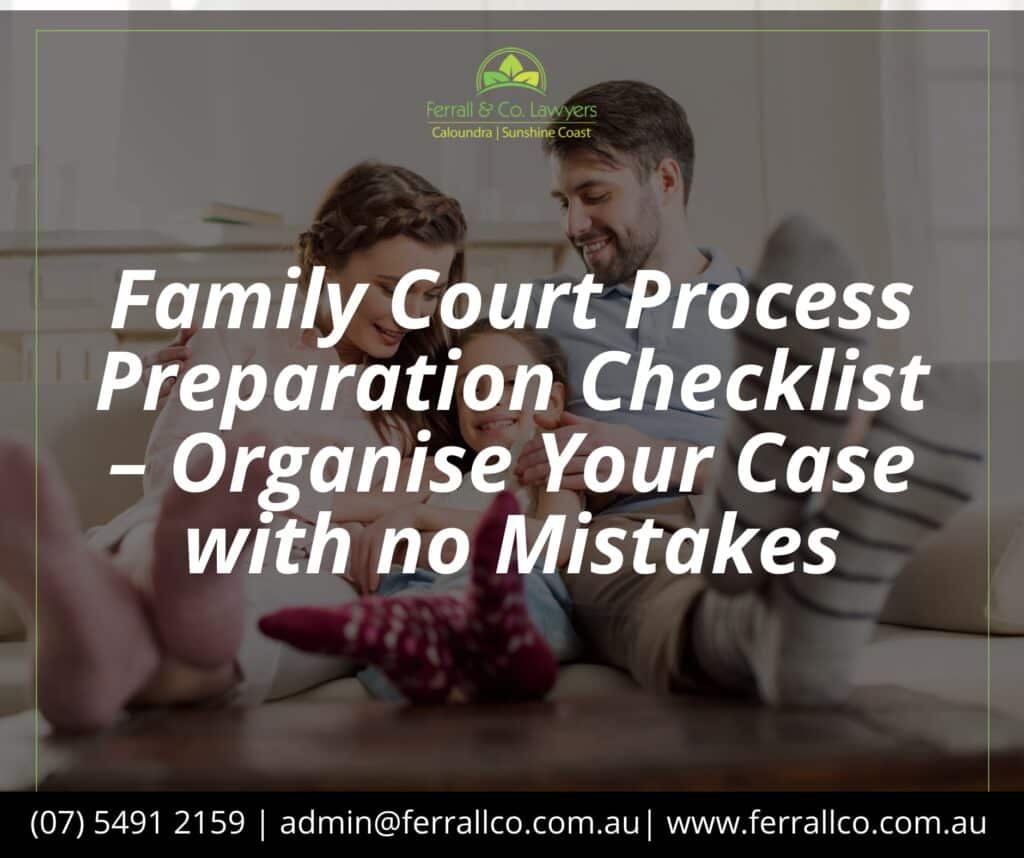
Family law can be intimidating, especially when navigating the Family Court of Australia and the Federal Circuit and Family Court. You can protect yourself by understanding the legal processes, including the role of family lawyers and Senior Judicial Registrars, particularly in cases involving sensitive issues like child abuse. We’ll explore family law, court processes, and how to effectively organise your case for a smoother experience.
Download our FREE Family Court Preparation Checklist for a detailed guide on the next steps.
Quick checklist guide
Separation
- Draft affidavit for ‘separation under one roof’.
- Update insurance policies.
- Separate finances.
- Inform government agencies.
Divorce
- Obtain your marriage certificate.
- Provide identification to prove eligibility.
- Receive a counselling certificate for marriages under two years.
- Joint applicants sign the Affidavit for eFiling Application (Divorce)
- Sole applicant requirements:
- Serve the divorce papers.
- Attend court if you have children under 18.
Parenting and property matters
- Property order
- Fully disclose your finances.
- Satisfy pre-action procedures.
- Parenting order
- Attend family dispute resolution.
- Property order
Family law litigation
- The first court event determines the necessary steps forward and makes interim orders if necessary.
- Submit a proposal for the interim order and a Case Outline Document to the Court at least two days before the hearing.
- Dispute resolution:
- A dispute resolution conference settles parenting disputes.
- Conciliation conferences mediate financial proceedings.
- A judicial settlement conference is a last resort.
- A compliance and readiness hearing ensures the parties are ready for a final hearing.
- During the final hearing, prepare for:
- The opening address which outlines the case.
- Provide evidence and make yourself and your witnesses available for cross-examination.
- Submit arguments to the Court based on the evidence and the law.
Download our FREE Family Court Preparation Checklist for a detailed guide on the next steps.
Preparing for divorce
The divorce process depends on your circumstances. The first step is to organise the documentation for your separation.
Separation
Separation doesn’t have a specific process. However, when dealing with the Family Court of Australia and the Federal Circuit and Family Court, there are important documents you need to organise. Seeking guidance from family lawyers, Senior Judicial Registrars, and a Family Dispute Resolution Practitioner can help clarify your obligations. Fact sheets provided by the court can also offer valuable information to ensure you’re well-prepared.
Affidavit
Some couples choose to ‘separate under one roof,’ a scenario often addressed in family law courts. The parties must submit an affidavit to the family court process to explain their situation. This affidavit outlines your living arrangements before separation, how they have changed, and other relevant details for the court process. If one spouse does not draft an affidavit, a third party familiar with the circumstances can submit one to support the case.
Update insurance policies
Certain types of insurance are crucial in family law cases, especially during the court process leading up to a final hearing in the Federal Circuit and Family Court, or the Family Court of Western Australia for parenting matters. These include life insurance, health insurance, and home and contents insurance. Many insurers require policyholders to update their status to reflect changes following separation or divorce, ensuring policies remain valid and effective. A directions hearing or consultation with a family consultant can help clarify these requirements during the court process.
Separate finances
In family law matters, many couples have joint bank accounts and credit cards that need to be addressed during the court process. Dissolving these joint finances is important, as the Federal Circuit and Family Court, or the Family Court of Western Australia for parenting matters, often considers financial independence when assessing separation arrangements. Maintaining independent finances not only simplifies navigating a separation but also provides clear evidence to the court that the relationship is ending. A directions hearing or guidance from a family consultant can further assist in managing financial matters effectively during the court process.
Inform government agencies
Government agencies want to know about a change in relationship status. If the parties are receiving child support or other assistance from an agency, it’s crucial that the couple updates their information. This is particularly important during family law proceedings in the Family Court of Australia or the Family Court, where a child impact report may be required as part of a court event to assess the child’s wellbeing and ensure proper arrangements are in place.
Divorce
There is a formal divorce process applicants follow.
Marriage certificate
You can access your marriage certificate, which is often required when navigating the family law system or engaging in the court process within the Family Court of Australia, the Family Court, or the Federal Circuit and Family Court. If you need a replacement, you can order one for a fee from the Registry of Births, Deaths, and Marriages. For certificates in a foreign language, it is essential to have them translated by an accredited translator to meet the requirements of the Family Court, especially during a court event.
Identification
To apply for a divorce in the Federal Circuit and Family Court or the Circuit and Family Court process under family law, the applicant must meet specific eligibility requirements, such as being an Australian citizen or a long-term resident. This is a critical step in the court process to ensure the application is valid and proceeds without delays, especially in a family law case involving parenting orders. Gather documents such as:
Birth certificate
Passport
Visa
Short marriages
In the Family Court of Australia or the Federal Circuit and Family Court, a marriage lasting less than two years requires marriage counselling as part of the court process. If reconciliation isn’t possible, the counsellor will issue a counselling certificate, which must be included in the divorce application. If urgent matters arise during a court event, an interim hearing may be necessary to address specific issues while the divorce proceedings are ongoing. Family dispute resolution or other dispute resolution methods may also be encouraged before reaching a final hearing.
Family violence
Some parties may be exempt from counselling during court proceedings in the Family Court of Australia process. If a spouse doesn’t participate or there are family violence concerns, counselling may not be necessary. In such cases, the party should draft an affidavit explaining why counselling wasn’t possible. If disputes arise, an interim hearing may be required to address urgent matters, and a family report might be ordered to provide insights into the family’s situation. Various court events, such as a conciliation conference or meetings with a Judicial Registrar, may be scheduled to facilitate family dispute resolution or other dispute resolution methods before proceeding to a final hearing.
Application
The parties can e-file the divorce application through the Commonwealth Courts Portal. In a joint application, both parties sign the Affidavit for e-filing the Application (Divorce). During the court process, various court events such as a conciliation conference may be scheduled, and a Judicial Registrar may oversee dispute resolution efforts. If the case involves children, a Court Child Expert may be appointed to provide expert reports that assess the family’s situation. In Western Australia, similar procedures apply, and parties should prepare thoroughly as the matter progresses towards a final hearing.
Sole application
Sole applicants have additional considerations when applying for a divorce in the family court process. They must ensure proper service of documents to the other party and may need to provide evidence of this service to the family law courts. A Judicial Registrar often oversees the initial stages, including dispute resolution efforts. If the case involves complex matters, a Family Dispute Resolution Practitioner may assist in facilitating discussions. Expert reports may also be required to assess the family’s circumstances, particularly if parenting arrangements are involved. Sole applicants should be well-prepared as the case progresses toward a final hearing.
Document service. A sole applicant serves their spouse with divorce papers as part of the court process. Service can be completed by hand, post, or through the other party’s lawyer, using a process server or a third party over 18. If there is a dispute over the divorce or related matters, the court may order a family report to assist in resolving issues and reaching an agreement. Once all matters are settled, the court can issue final orders to formalize the arrangements. Include the following documents:
Divorce application.
Affidavit for eFiling.
Marriage, Families and Separation brochure.
Acknowledgment of service (Divorce).
A letter requesting that your spouse sign the Acknowledgment of Service.
Download our FREE Family Court Preparation Checklist for a detailed guide on the next steps.
Court attendance. As part of the Family Court of Australia process, you must attend a court hearing if you’re a sole applicant and have children under 18. Attendance ensures the family court can review arrangements for the children and confirm they are in their best interests. A Judicial Registrar may oversee a dispute resolution conference during the proceedings. In other circumstances, court attendance isn’t required unless you specifically request it, the family court deems it necessary, or the matter involves a final hearing. In Western Australia, similar processes apply under the state’s family court system.

Parenting and property matters
Parenting and property matters can be arranged in different ways, but they must be resolved within specific timeframes under the family court process. For divorces, arrangements need to be made within one year, while for de facto separations, they must be finalized within two years. A dispute resolution conference or settlement conference may be required to facilitate an agreement between parties. If disputes persist, the court may order a family report or child impact report to assess the family’s circumstances and the child’s best interests. Seeking legal advice early in the process can help ensure compliance with timelines and prepare for the first court event if necessary. Court proceedings should be considered a last resort when all other resolution efforts have been exhausted.
If these timelines are not met, you may need to seek permission from the family court to proceed. Addressing these matters through the family court process ensures they are legally binding and enforceable during family court proceedings.
Property order
In the family law system, obtaining a property order through the Federal Circuit and Family Court process requires gathering detailed information about your financial position. This includes documenting assets, liabilities, income, and expenses. Family lawyers can assist in ensuring all relevant financial disclosures are properly presented. As part of the family court process, dispute resolution methods may be encouraged before proceeding further. However, in cases involving family violence or significant conflict, the court may intervene more directly. If an agreement cannot be reached, the matter may proceed to a final hearing where the court will make a binding decision.
Proper preparation ensures accuracy during family court proceedings and helps streamline the process, especially if you are seeking consent orders to formalize an agreement between parties. Consent orders provide a legally binding resolution within the family law system, offering clarity and enforcement of property arrangements.
Full disclosure
Property orders require each party to disclose their finances. This can include the following:
Valuing superannuation assets.
Producing business records.
Collecting bank statements and payslips.
Gathering information on liabilities such as credit cards and mortgages.
Recording information on stock portfolios.
Pre-action procedures
Before seeking a property order, you must complete pre-action procedures:
Provide the other party with the pre-action procedures.
Invite the other party to an agreed-upon mediation and dispute resolution service.
Make a genuine effort to reach an agreement.
Provide the other party with a notice of your intention to seek a court order.
Once these have been completed, you’ll receive a Genuine Steps certificate that must be included in a property order application.
Parenting order
Family Law Courts prioritise a child’s best interests in parenting proceedings. Consent orders are the most effective way for most couples to make parenting arrangements.
Family dispute resolution
Couples who can’t agree on parenting must attempt family dispute resolution before starting the family court process. Once this is complete, the parties receive a section 60I certificate, which confirms an attempt at resolving the dispute was made. A Judicial Registrar may oversee the initial stages of the case, encouraging further dispute resolution where appropriate. If the dispute remains unresolved, the court may schedule additional court events or hearings, and the matter could proceed to a final hearing where a binding decision will be made.
Family law litigation
If the parties fail to form an agreement for a consent order, they can proceed to litigation. The litigation timeline involves several hearings.
First court event
The first court event occurs one or two months from the filing date. The Judicial Registrar determines the steps to be taken to progress the matter. This can include orders for:
Evidence gathering.
Asset valuation.
Receiving expert reports.
Completing a parenting course.
The Judicial Registrar may make interim orders at this stage.
Interim hearing
The Court will decide on any proposed interim orders. The parties must submit the orders they propose and a Case Outline Document at least two days before the hearing.
Dispute resolution
There are various dispute resolution processes.
Dispute resolution conference
This is used for parenting proceedings. A Judicial Registrar may conduct it with the assistance of a Court Child Expert.
Conciliation conference
A conciliation conference handles financial matters mediated by a Judicial Registrar as part of the family court process. It is commonly used in both the Family Court of Australia and the Federal Circuit and Family Court. If disputes remain unresolved, the court may proceed with further dispute resolution methods or schedule a final hearing. Key figures involved may include a Senior Judicial Registrar and family law experts. The process ensures thorough financial disclosure and may require expert reports to guide fair settlements.
Judicial settlement conference
A judicial settlement conference is a last resort in the family court process. During this court event, the judge mediates the dispute between the parties in a confidential setting, often after other dispute resolution efforts, such as a dispute resolution conference or involvement from a family dispute resolution practitioner, have been exhausted. This process can include input from a family consultant or court child expert, and the court may order expert reports or a child impact report if parenting matters are involved.
Compliance and readiness hearing
The compliance and readiness hearing ensures that the parties have satisfied all court directions prior to the final hearing.
Final hearing
At the final hearing, the Judge will make a final determination. During the hearing, the parties will:
Make an opening address. Give the Judge an overview of your case.
Provide evidence. The parties and their witnesses should be available for cross-examination.
Argument. Make submissions to the Court based on the evidence and the law.
The Judge will make a final decision within three months of the final hearing.
Conclusion
The Family Court process has defined procedures for handling any legal matter, including family court proceedings, conciliation conferences, and the first court event. By understanding these steps, you can ensure you’re prepared to present your case effectively and work towards a successful outcome.
The team at Ferrall and Co. went above and beyond with representing myself in legal proceedings to do with family law. Definitely worth the money you pay and treat you with the respect and professionalism that you deserve.
- Dam Kel
Seek legal advice so you can navigate the family law system properly. Contact us today for a free initial consultation.





